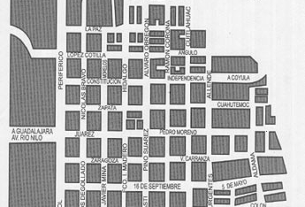A Balloon in Cactus
“What is Christmas like in Mexico?” asked my friend, Edward. It didn’t take much encouragement for me to eagerly share this experience:
Once upon a Christmas nighttime, in a tiny village on the shores of Lake Chapala in the State of Jalisco, began las posadas, which means “the inns.”
At the shy invitation of my beloved housekeeper, Josefina, I joined her in the most memorable Christmas celebration of my life.
Literally right outside my door which opened onto a small side street just off the highway, gathered the youth of the village – from tots to teenagers. Two children, about 8 years old, were dressed as Mary and Joseph. Another little child carried a lantern to light the way.
People of all ages soon collected there. In the diversified throng were shawled crones, young fathers with niños perched atop their shoulders, and beautiful brown women beamingly holding the hands of other children, each dressed in his best.
A young man with a guitar played Las Mañanitas; everyone sang, not loudly as is often the case at Mexican events, but very softly which seemed somehow more spiritual.
A round little village priest chanted the story of las posadas, of how Mary and Joseph tried to find room at an inn and were turned away from that shelter and others, again and again.
We followed along behind the celebrants, additional crowds gathering behind us, as Mary and Joseph walked on the cobblestone streets to the first “inn” – a modest Mexican casita, decorated for the occasion with many-colored lights and a bedsheet as backdrop to a Nativity scene. The kneeling grandfather, dressed in white, was absolutely still. Even the gentle breeze showed respect and did not flutter his neatly combed white hair. He was being blessed by his beautiful little granddaughter, as motionless as he, dressed all in white, with silvery wings and halo, created by the loving hands of Mama, whose proud face peeped out from behind the window’s lace curtains.
Here the procession halted while Padre intoned blessings, and we, part of the ever-swelling throng, joined him in singing Las Mañanitas, accompaning the youngsters’ voices, raised high in spiritual adoration. Each stop at an “inn” found a different creative, spiritual cyclorama of living participants depicting Christmas scenes.
The procession ended near midnight at the yard of the elementary school where the children were given Christmas sweets made by the women of the village, and a gaily painted piñata was happily carried into the schoolyard.
Across the street stood the village church, whose entrance was now graced by Josefina, there to proudly welcome her youngest son, Fernando, an altar boy serving his first Midnight Mass. It was to be the first Mass I attended in over 30 years.
For the eight remaining nights preceding Christmas, everything was to be repeated on different streets. On Christmas Eve, one particular “inn” will at last receive Mary and Joseph for the night and, for the first time, a baby will appear, and be placed in the manger.
In this tiny village live people of unconquerable faith. How could I be anything but both humbled and awed?
No shop contains the gifts these families gave to God — time, patience, creativity, music, and love.
Chestnuts don’t have to roast, nor does snow have to fall, to have a happy Christmas. Love is all.

